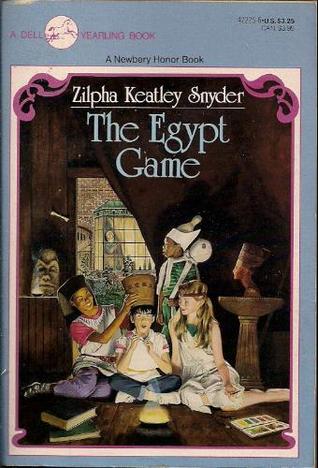But, actually, that was the way with all of the Egypt Game. Nobody ever planned it ahead, at least, not very far. Ideas began and grew and afterwards it was hard to remember just how. That was one of the mysterious and fascinating things about it.
Not every single book that I read as a child was a science fiction or fantasy novel, just MOST of them. I have a feeling that the cover of Zilpha Keatley Snyder’s Newbery Honor book The Egypt Game must have tricked me into believing it was a fantasy. Surely, with a name like that, it must be a portal fantasy full of mummies, pharaohs, and gods (a childhood fancy that is problematic unto itself). My impression wasn’t entirely incorrect. But it would be more accurate to say that the portal in The Egypt Game is the vivid imaginations of the characters themselves, a magic just as powerful as anything in Narnia.

The truth is that The Egypt Game is actually more of a mystery, with quite a lot of suspense. The story revolves around a group of neighborhood children who invent a fantasy world for themselves. April has just moved in with her grandmother after being somewhat abandoned by a carefree mom. She quickly meets Melanie, and her little brother Marshall, and the two girls realize they share a vivid imagination and love of playacting. When they stumble upon the abandoned yard of a reclusive old man everyone calls the Professor, their imaginings shape themselves around the histories and myths of Ancient Egypt. Unfortunately, when a neighborhood child is murdered, everything changes.
Though I honestly don’t recall being quite as dramatic or imaginative as April, Melanie, Marshall, and later Elizabeth, Toby, and Ken, at least not in the sixth grade, these are incredibly rendered characters with well-explored motivations. There are moments dedicated completely to making sure that you understand why the children behave as they do, that feel almost more appropriate to a book written for adults. This is particularly true when Snyder explores the responses that the neighborhood has to the murder, which, as you might expect, include false accusations, wild rumors, and restrictions. The kids, of course, have their own ideas about the murder, including their belief that the Professor is innocent and the restrictions are merely a hindrance to their game.
The game itself is a great and wonderful adventure. The children erect altars to various Egyptian gods and pretend that they’re high priestesses, high priests, and Egyptian Pharaohs. It’s a real joy to watch them building an entire culture based on their research (they use the library a lot!), including ceremonies, rituals, and their own version of hieroglyphs so that they can communicate in secret. This is all matched by their ingenuity and craftiness as they use found items to bring their rich imaginations to life. As I said, this might not be a fantasy novel, but the glimpses into the stories that the children creates is just so magical that it’s nearly indistinguishable.
However, that is one of the most problematic aspects of this book. Egypt is not a fantasy land, but it certainly appears to be such in books like The Egypt Game. American culture and education tend to erase modern Egypt and her people, preferring to teach those portions of Ancient Egypt that turn it into something as fantastical as Disney’s Aladdin or Brendan Fraser’s The Mummy. This exoticizing of non-western cultures is a very real problem which, unfortunately, I am unequipped to comment on more thoroughly. It should also be noted that the language of this book is very decidedly 1960s and, especially depending on your version, occasionally marked by racially charge words (“negroes,” “oriental”). That said, this was probably the most diverse novel of my childhood: Melanie and Marshall are black, Elizabeth is Chinese-American, and Ken is Japanese-American. As sad as that is, this diversity was eye-opening for me in the 1980s.
I honestly couldn’t tell you what it is about The Egypt Game that has kept it in a coveted spot on my bookshelves for over 30 years. I think there was just something so familiar about the kids, so fantastic about their ability and freedom to create this entire realm of their imagination. It either inspired or ran parallel to what my friends and I were doing at around the same age, though our games were inspired by things like The Hobbit and ElfQuest and we never had the direct fear of a child murderer. The Egypt Game is as close a book as I will ever come to those halcyon days in which my imagination WAS magic, a magic fueled by books we read at the library and built out of whatever scraps we could find. So, no, The Egypt Game isn’t a fantasy, but it’s as close to the fantastic as your childhood can get.
The Egypt Game
Written by Zilpha Keatley Snyder
Originally published in 1967








